
At just under 6000 yards, many will dismiss Kington as far too short and nothing but a bit of fun, though fun Kington certainly is, the course should not be taken lightly. Hutchison’s fondness for North Berwick, a links famous for its variety and quirkiness, enabled him to value unusual concepts without discarding what was at the time modern design theory. Although I suspect serious changes occurred to arrive at the current layout, the original design opened in 1926. Major CK Hutchison produced a remarkably crafty course which relies greatly on gaining the correct angles of approach, for the greens often fall heavily away from the front or sides making recovery from the wrong position terribly difficult despite appearances to the contrary. It should come as no surprise that the Major could create such a gem. He was a well known figure in the game as an amateur (he reached the final of the 1909 British Amateur) and as a serious student of architecture through his membership of Huntercombe, an early Willie Park Jr. ground breaking design. On a more practical level, James Braid relied heavily on Hutchison’s knowledge during the design and construction of Kings and Queens courses at Gleneagles. Additionally, for a brief period starting in the late 20s, Hutchison was in partnership with Majors GC Campbell and SV Hotchkin. The company, Ferigna Incorporated, was responsible for all facets of the golf course business. This “Trinity of Majors” is famously responsible for the creation of Pulborough, a course well known for its combination of beauty and fierce hazards.
Kington can fairly be described as an inland-super-mare. The sea is miles away, yet the golf at Kington is remarkably similar to seaside golf due to the keen terrain. There are no bunkers and the course is not overly wide with practically no shaping of the fairways. In fact, Kington is the epitome of why wide is good. Let the golfer open the shoulders, but if he places the ball in the wrong spot he can be left with a devil of a recovery – often times from quite close to the hole. Bradnor Hill is among the chief defences with its slopes acting for and against play. The micro undulations can leave a player confounded on how to make solid contact with anything other than short irons, or indeed the putter. The course climbs the hill for much of the front 9 and affords arresting views of the Brecon Beacons, Malverns and Black Mountains. The club claims that at 1284 feet Kington is the highest course in England, but that isn’t important other than to impart that wind is another of Kington’s primary defences. The greens tend to be narrow and many are angled against fairways and/or over deep fall-aways. While there are plenty of unknowing breaks to be had, the greens are essentially flat. Finally, Kington’s turf is as fine as one could hope to find on most highly rated links. There is a springiness which encourages the player to be aggressive both on the fairways and greens.
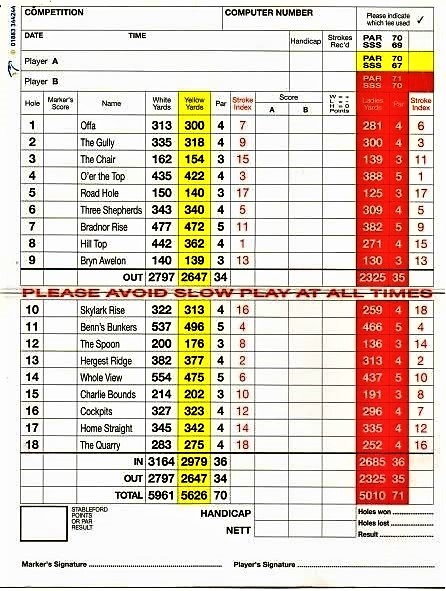
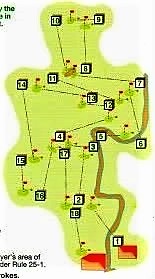
An aerial tour of Kington.
https://www.youtube.com/watch?v=dfmCm-ZoK5c&app=desktopPeter Finch video at Kington.
https://www.youtube.com/watch?v=TouLqFtZzKI&feature=youtu.beStanding on the first tee one immediately senses he is in for a treat. A decent drive will make it past a shallow recess which is part of Offa's Dyke Path. This path was created out of what is thought to be an 8th century boundary between Mercia and Powys built by King Offa. The first three holes make steady progress up Bradnor Hill. All are good and require a deft touch rather than brute force.

When the course is keen one can readily see why such width is required. In the conditions depicted below, a drive down the middle of the fairway with any hint of draw will finish in the left quarry.
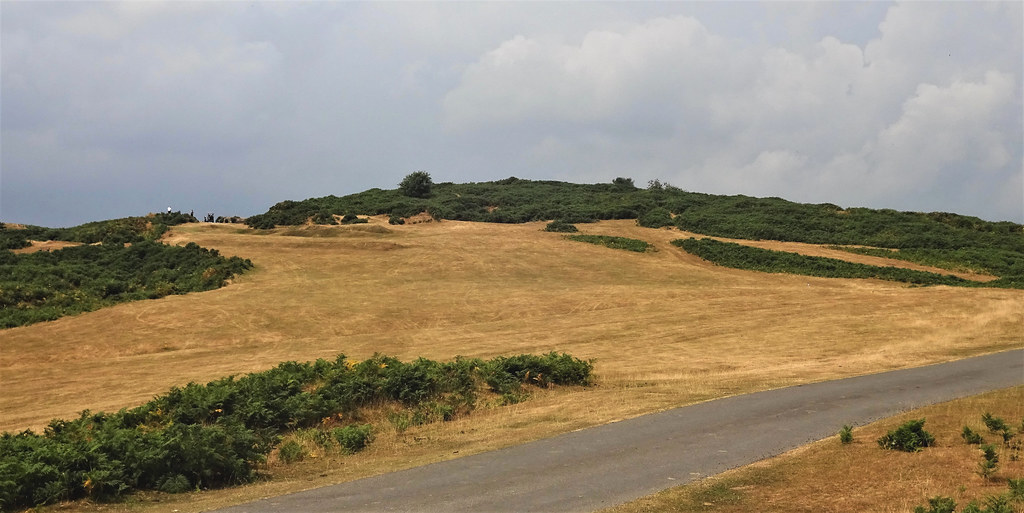
Below is a common approach angle for #1 and one of the reasons I think Kington is a wonderful course - this design is 100% percent about the angles of play and how to use gravity to the best effect. The green is dramatically influenced by grade level slopes. Because of this the putting surfaces can be surprisingly fast and turn where it seems improbable.

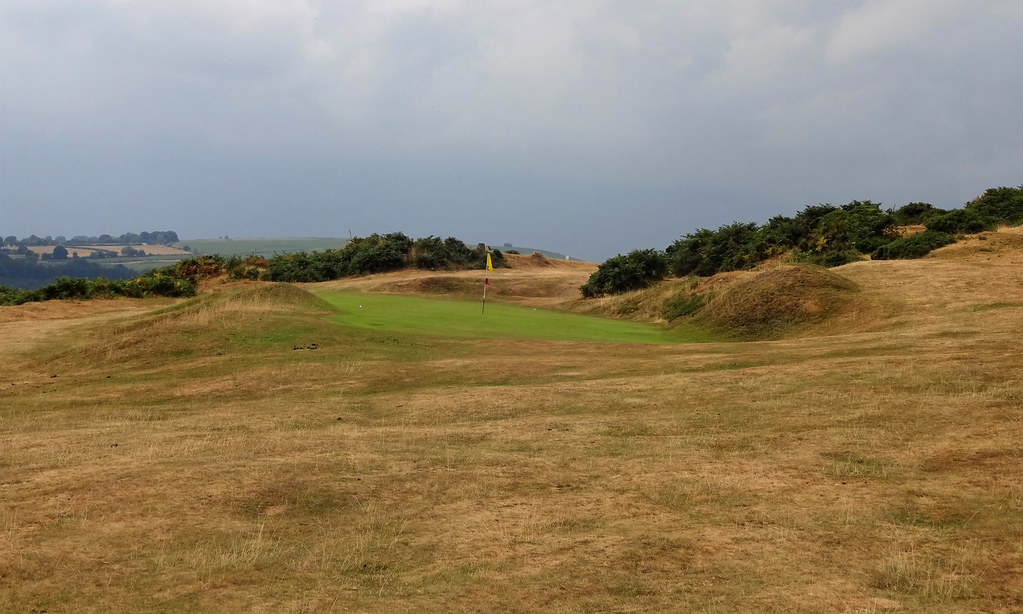
The reader can see the angled nature of the green from the 2nd tee.

The 2nd turns hard right around a higher part of Bradnor Hill. This higher ground which curves around the 2nd and 3rd greens used to be part of an horse racing track. It is very easy to hit a drive well past the turning point left or in a deep gulley right. A good line is the old cock fighting pit which is just in view from the tee. The green moves deceptively hard from front right.
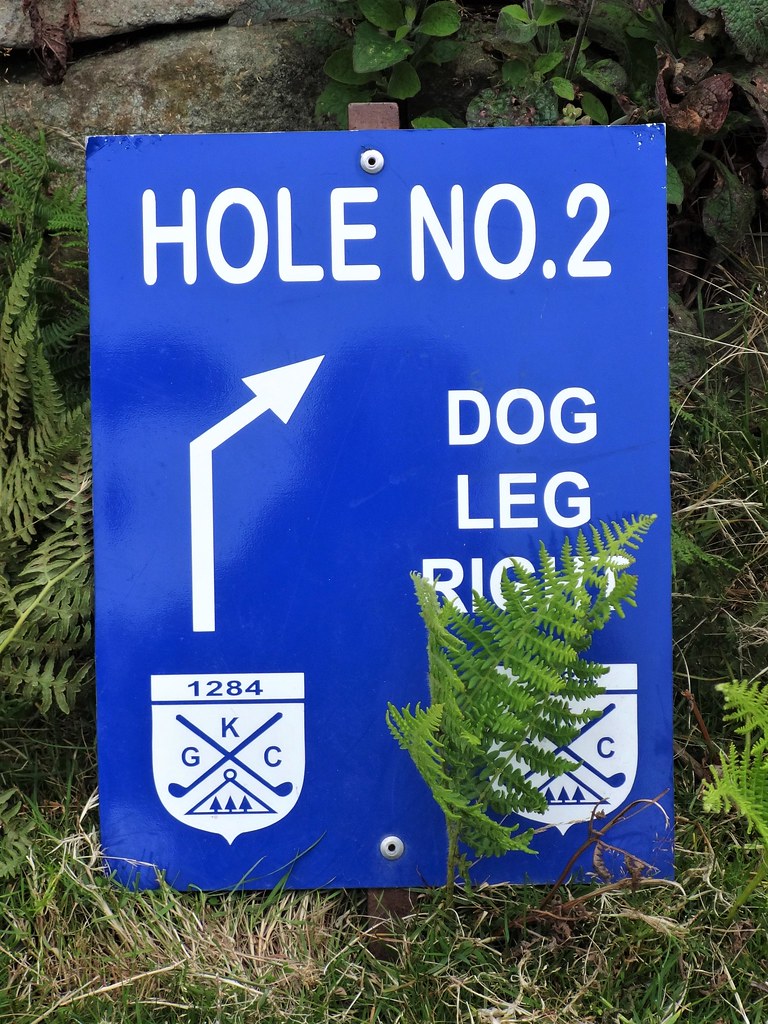
#3 is a useful par 3 to a shelf green that is deceptively large. The gentle start abruptly changes on the 4th; still uphill, brutish at 435 yards and usually into the prevailing breeze. This is one of the few holes at Kington which requires a carry. The second shot doesn't get any easier. The green is set down a left to right slope with two tiers in the same direction. Suffice it to say that a par here is well earned. One aspect of Kington which is disheartening are the scattering of trees behind some skyline greens. In the case of the 4th it is a exception because of the lovely tree.
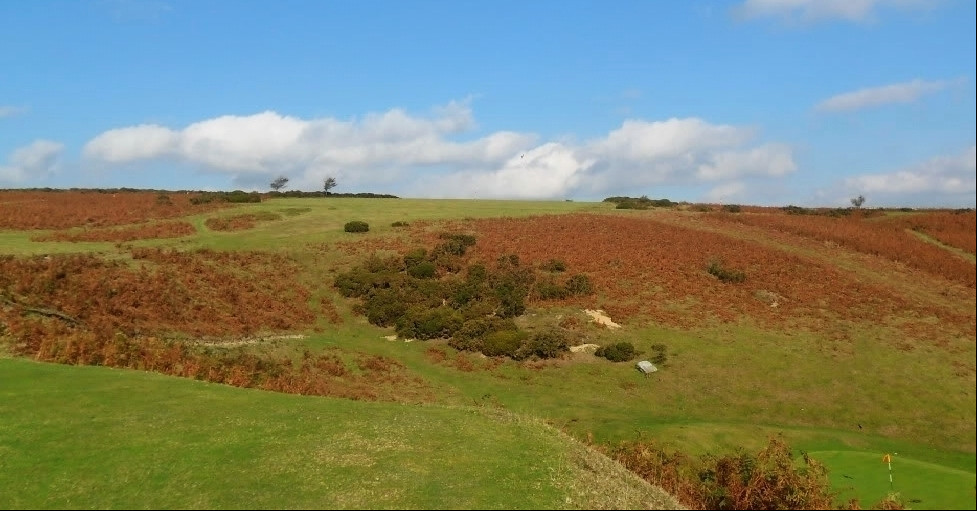
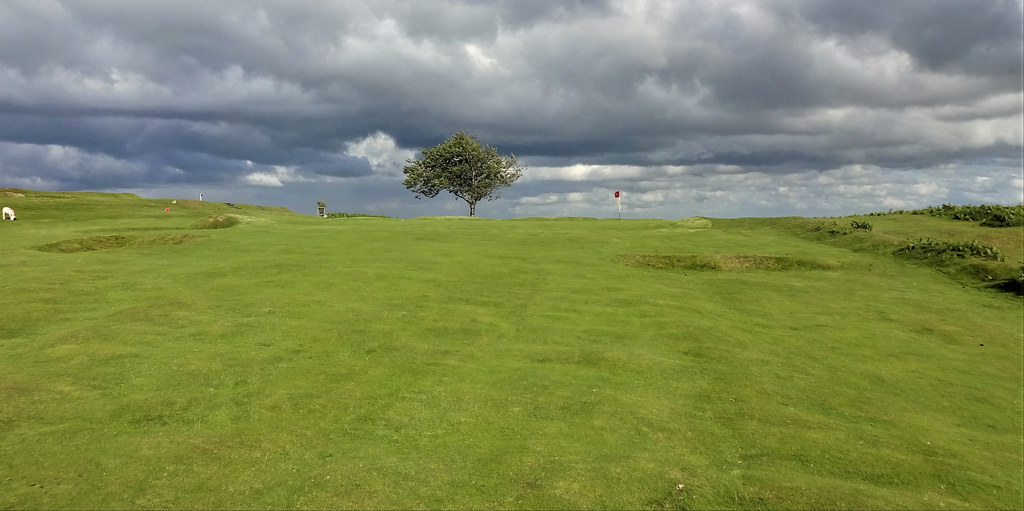
Kington's very own Road Hole is sublime, as are all the 3 pars at Kington. The surface of the green is blind and the short iron needs to kick in from the left. As is evidenced by the road..this is farm country.
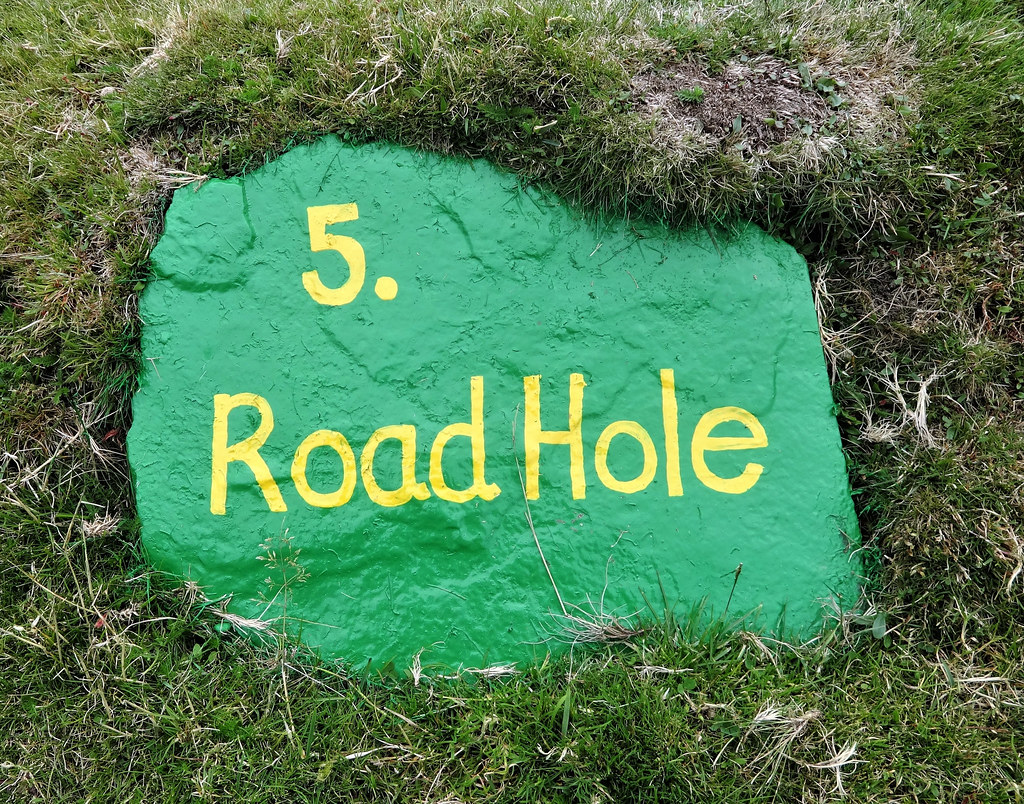
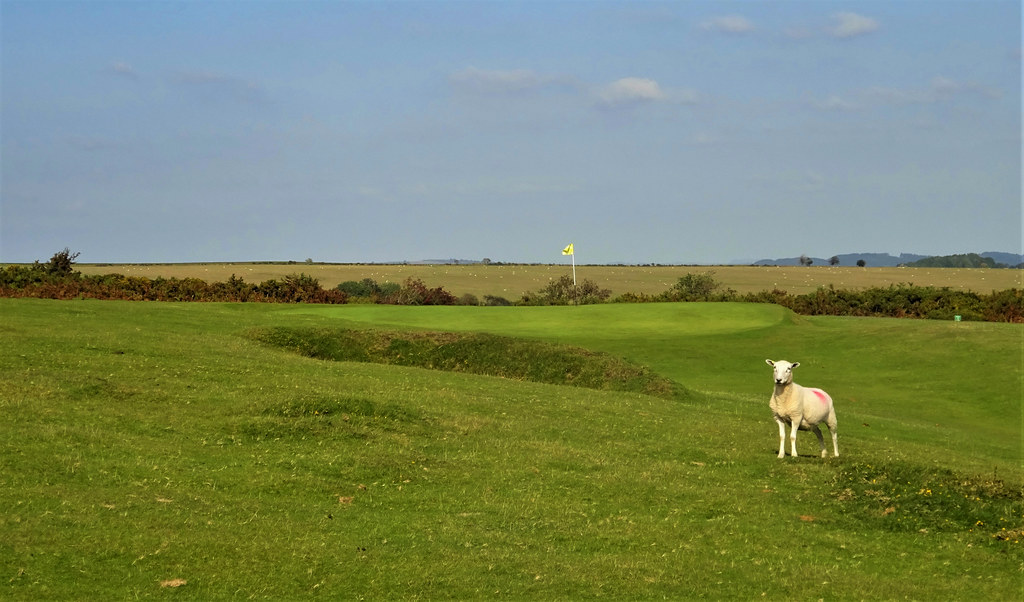
One had better know how to flight his ball and control it once it lands or Kington will eat you alive with niggling recoveries. The 7th is an up and over reachable par 5 with a green split in two by the crest of rise. The visual clues tell the golfer the green falls from front to back, but mysteriously the putt from the rear of the green seems to be downhill as well. This may be because the green is near the summit of Bradnor Hill.
#8 is a superb par 4 which can be driven from the old tees, but the club has committed a serious breach of architectural malpractice by building a new set of tees much further back and right. This addition completely ignores Hutchison's original intent. From what is now the ladies tee, the hole is reachable, but legs left if the player chooses to try for the pitch and putt birdie. For those going for the green, anything left all but eliminates any chance of birdie. More than a few holes have a "gate" which is a free running access to the green for those in the correct position. Often times this gate is off-centre which creates a dogleg effect even though the fairways tend to be very wide. Kington is also known to have patches of gorse which cause a spot of bother here and there.
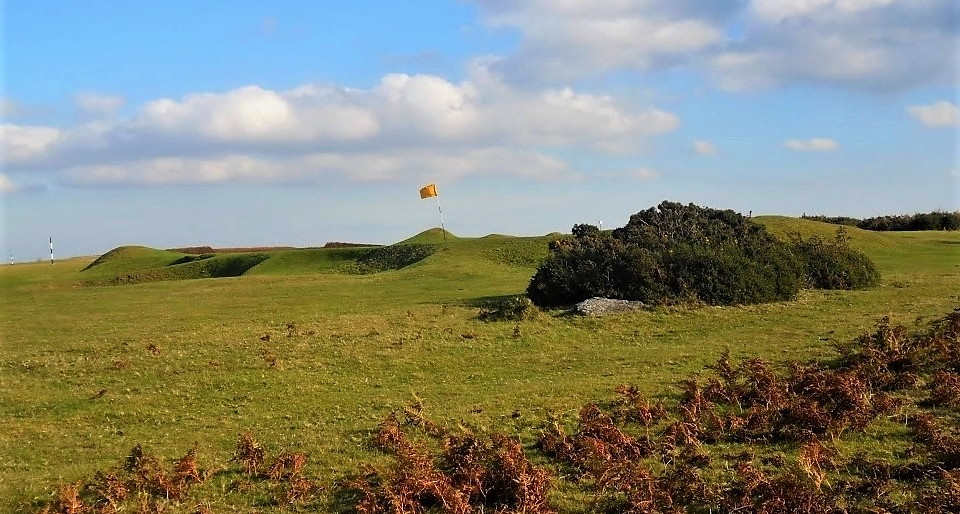

The course continues to wind its way around Bradnor Hill with blind drives, front to back sloping greens and skyline greens as particular features. #9 from the right tee - as tricky as it gets! Hollows guard the natural kick in area to the left of the green which, like the 8th, runs away from the tee.
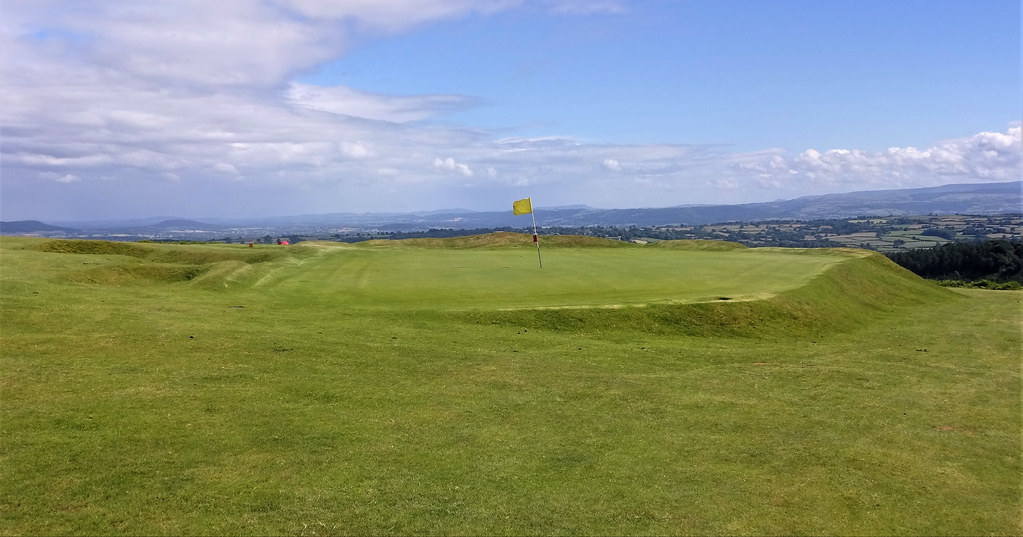

The 10th sports another blind drive and side by side two tier green. #11 is a reachable par 5 with a clever front to back green fed from a downhill fairway. This hole marks the point of a general descent back toward the house. Yet another formidable short hole, the twelfth is one of the author's favourites.
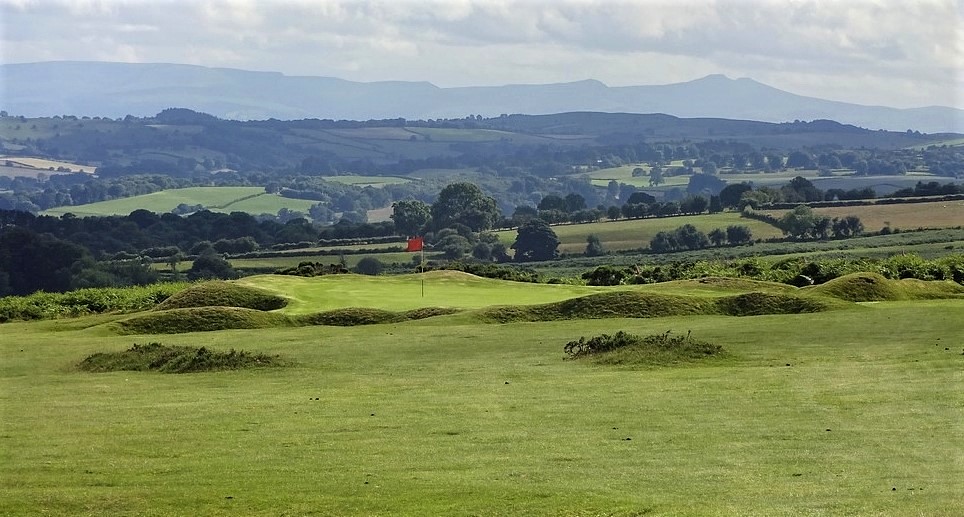
There is a gate off-set right and golfers who can't make the carry over the mounding do attempt the running hook. This picture, taken from the right side and forward of #12 tee, highlights how a player can use the slopes to great advantage.
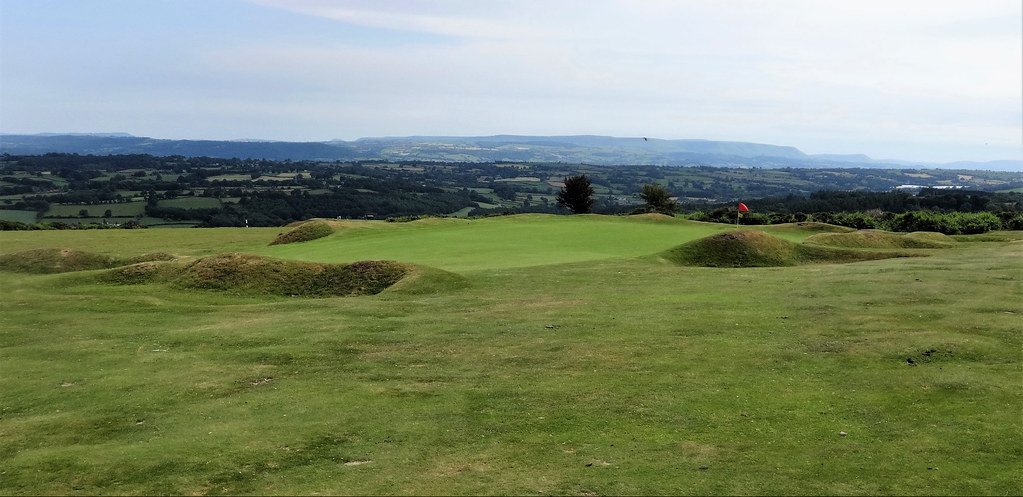
Behind the green.
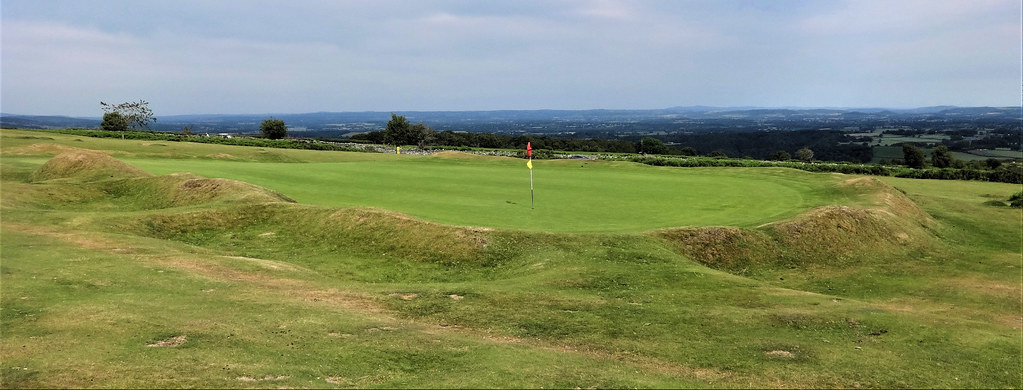
After another blind drive which requires one to shape the tee shot into the hill or ride the high side as long as possible, #13 is a terrific par 4 in the middle of Kington's purple patch. A view of the green well beyond the driving area.

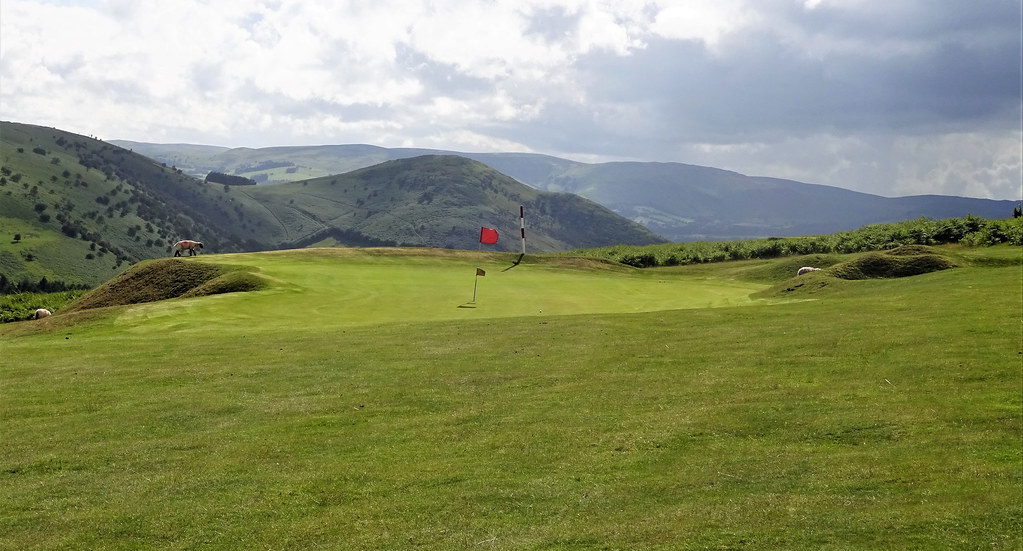
Left side of the green.

A look at the rear of the green from #13 tee.
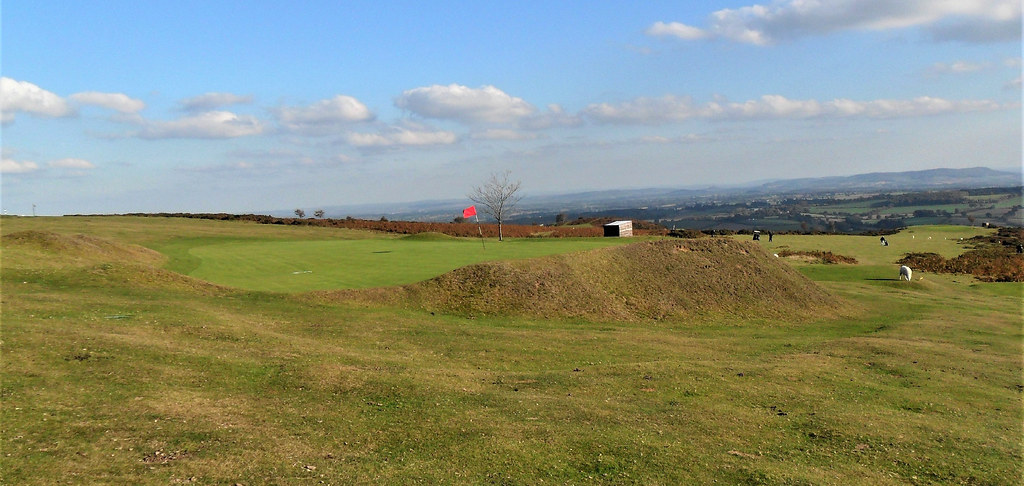
The 14th continues the thrilling golf with this reachable par 5. More people than not tend to find the ferns when trying a two-shot bash at this green. An aspect of Kington which many may notice is the often random nature of the rough lines. It can be hard to discern one's fate when flirting with the ferns.

The green has a false front, but once past this deception it then falls away from the player. Brilliantly, Hutchison created a lip on the back left of the green which helps contain approaches if the player gets into position to use the feature. Otherwise, if aiming directly at the flag and a bit strong, the ball is apt to roll 50 yards beyond the green.
The 215 yard 15th completes the set of very good short holes.

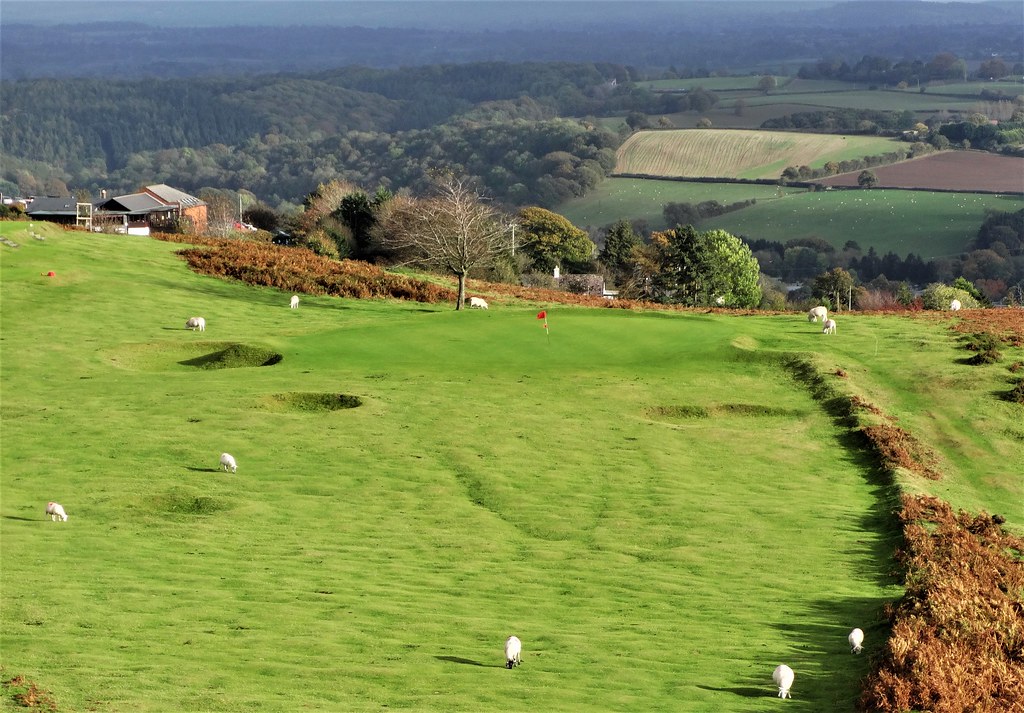
The penalty for coming up short is imaginative as this sort of humpty bumpty land features prominently at Kington.
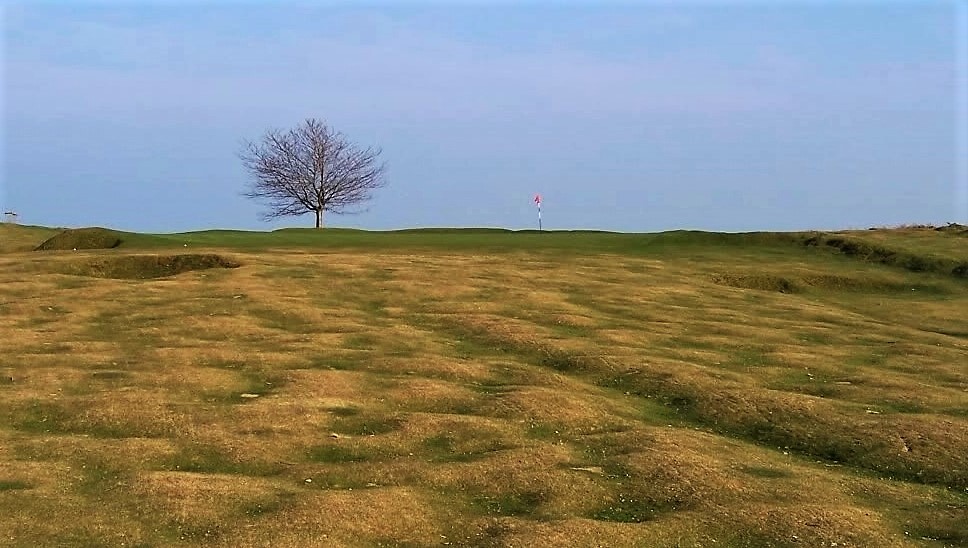
A side view of the hollows.
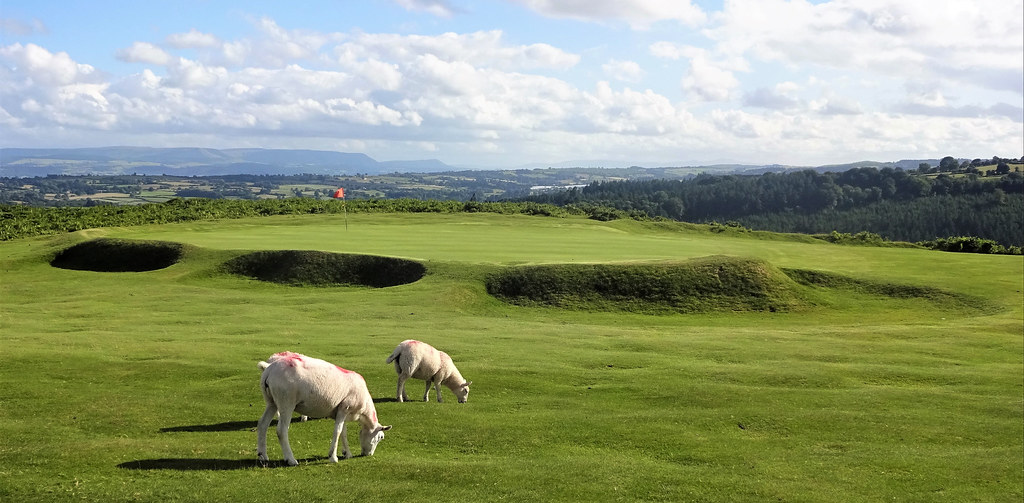
The obscured approach to #16. This green was significantly softened some years ago. Bitter debate still rages over whether it was a good or bad idea to level the surface.
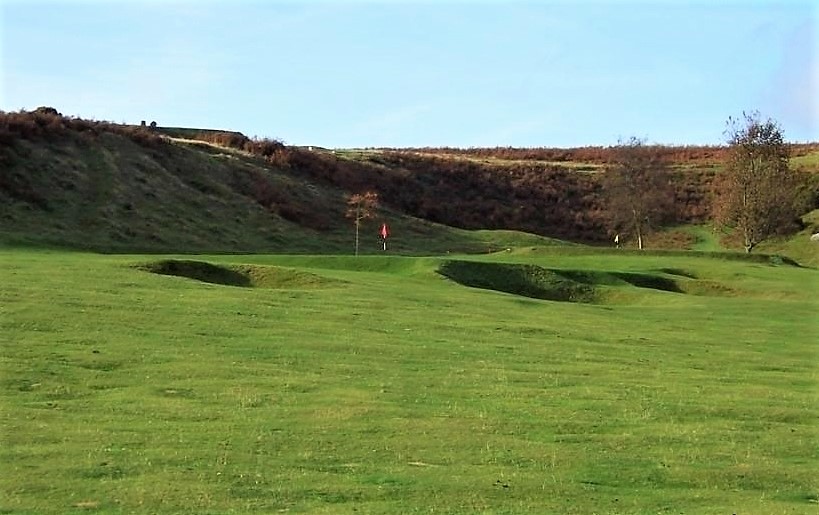
The seventeenth is a classic example of why width is so important to creating strategy. This is a short par 4 with a wide fairway that often plays downwind. However, as is the theme throughout Kington, one must gain the correct angle or be left with a very difficult approach to this green which slopes toward the clubhouse down the hill.
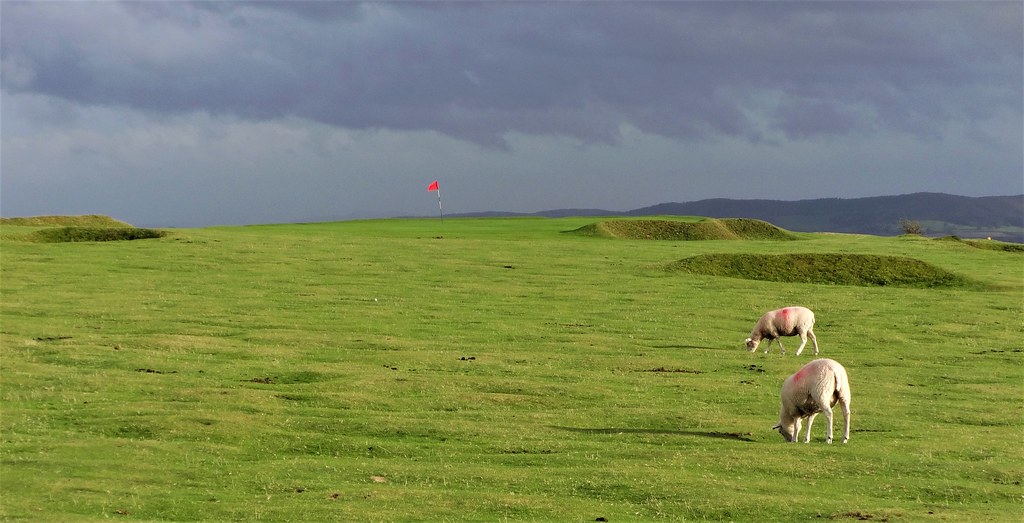
A closer look. Notice there are no long grass stems as in the previous photo. The club has recently started cutting the fairways more often. Time will tell if the upgraded maintenance will eliminate the random fairway lines...let us hope not for that is one of the aspects of Kington which make it so endearing.
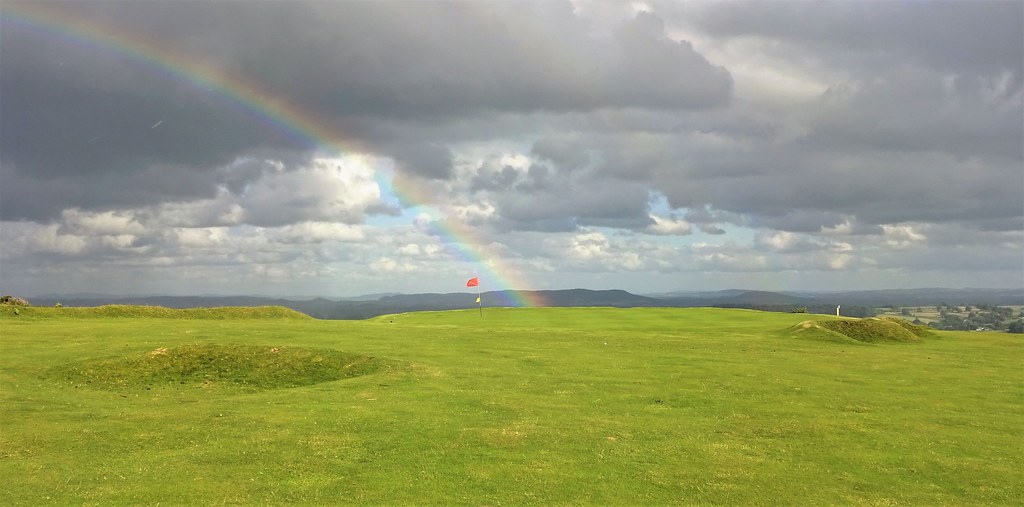
We finally come to what I think is the finest finishing hole in golf. It isn't often that a significant percentage of handicap golfers can stand on the tee of a par 4 and aspire to a 3. However, on many days this is exactly the goal on Kington's 18th. Choose a club, take aim at the pro shop, fire away over the quarry and let the fun unfold.
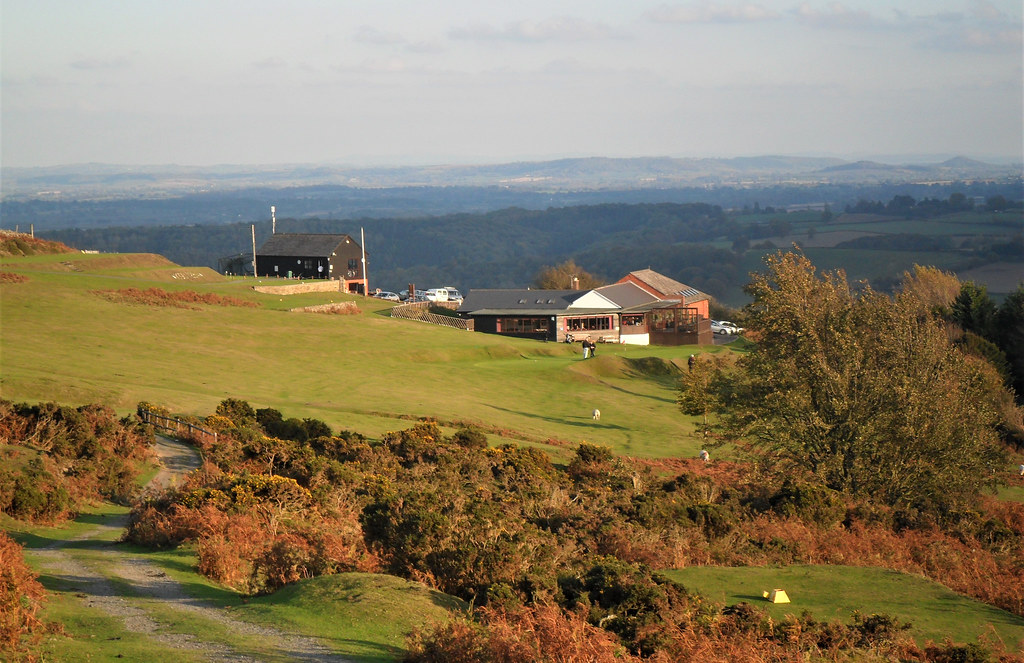
The green is an extremely narrow target.

Looking back toward the tee and the 1st fairway.

Bernard Darwin had this to say about Kington: “Wisely, no attempt has been made toward a ‘set’ or stereotyped layout…outstanding in its variety, interest and charm.” As with other courses such as Woking and Beau Desert, for those who give Kington due attention, a gradual appreciation and admiration will emerge. There are no less than three All England candidates in numbers 1, 12 and 18 with the last being this author’s pick as the finest finishing hole he has experienced. One’s handicap may be flattered if he chooses to play Kington on its terms, but without question fun will be had by one and all. 2* 2020
Should one decide to stay in Kington for a night and/or get thirsty, there is a wonderful pub on the outskirts of town. With its charming front room ambience, the Ye Olde Tavern is aptly named.

While the town is down on its luck, there is still a lot to like about Kington.

Ciao